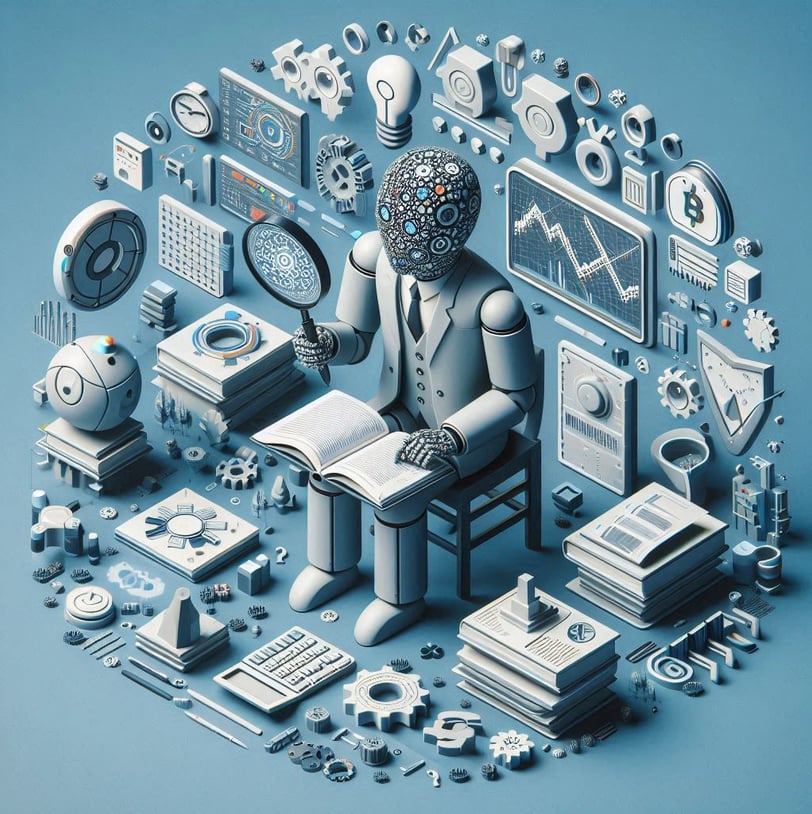Knowledge is the fuel that powers the train of progress.
Day 37: How Understanding Algorithms Sharpens Decision-Making
Algorithms have become an integral part of modern society, influencing many aspects of our daily lives, from online shopping to traffic navigation, medical diagnoses to personalized recommendations. While the term "algorithm" may evoke images of complex mathematical equations or coding languages, it is essentially a set of rules or instructions designed to solve problems or make decisions.
Srinivasan Ramanujam
10/24/20244 min read
100 Days of AI for All: Day 37
How Understanding Algorithms Sharpens Decision-Making
Introduction: The Role of Algorithms in Everyday Life
Algorithms have become an integral part of modern society, influencing many aspects of our daily lives, from online shopping to traffic navigation, medical diagnoses to personalized recommendations. While the term "algorithm" may evoke images of complex mathematical equations or coding languages, it is essentially a set of rules or instructions designed to solve problems or make decisions.
Understanding algorithms isn’t just for programmers or data scientists. Anyone can benefit from grasping how algorithms work and apply to decision-making, whether in business, education, healthcare, or personal development. On Day 37 of our “100 Days of AI for All” journey, we explore how understanding algorithms can enhance your decision-making skills, offering practical insights and examples.
What Is an Algorithm?
At its core, an algorithm is a step-by-step procedure used to solve a specific problem or perform a task. In the context of AI and machine learning, algorithms are the backbone of decision-making processes, automating tasks like sorting, classifying, and predicting outcomes based on input data.
Examples of algorithms in daily life include:
Google Search Algorithm: Determines which search results are most relevant to your query.
Netflix Recommendation Algorithm: Suggests movies or TV shows based on your viewing history.
GPS Routing Algorithms: Finds the most efficient route to your destination based on traffic and road conditions.
By better understanding these processes, you can become more aware of how decisions are made around you and leverage this knowledge to make more informed choices yourself.
How Algorithms Impact Decision-Making
Data-Driven Decision-Making Algorithms work by analyzing vast amounts of data to identify patterns, correlations, and trends. When you understand how algorithms process information, you become more adept at making data-driven decisions. This means you can:
Prioritize Objectivity: Algorithms can strip away biases and emotions, focusing on the data to guide your choices.
Analyze Risks and Opportunities: With a solid understanding of algorithmic decision-making, you can break down risks and opportunities in a structured way, using data to validate or reject assumptions.
Identify Patterns: Algorithms are particularly skilled at pattern recognition. By training yourself to recognize these patterns, you can make more informed predictions in fields like business, finance, and personal life.
Efficiency in Problem-Solving One of the biggest advantages of understanding algorithms is learning to think systematically. Algorithms often follow a sequence of logical steps that are optimized for efficiency. Applying this mindset can help you:
Break Down Complex Problems: Algorithms often decompose large problems into smaller, manageable tasks. When faced with a complex decision, you can adopt the same approach, dividing it into stages to simplify the process.
Optimize Your Solutions: Just like an algorithm seeks the best possible outcome, you can learn to evaluate your choices more critically to find the most effective solution with the least amount of effort or resources.
Bias Awareness Despite their objectivity, algorithms can still reflect human biases, especially if the data they're trained on is biased. By understanding how algorithms function, you become more aware of potential biases and can ask critical questions such as:
What data is being used?
Who designed this algorithm, and what assumptions did they make?
Are there unintended biases in the data that could affect outcomes?
Recognizing bias in algorithms allows you to make fairer, more inclusive decisions in your own work, ensuring that you aren’t simply accepting algorithmic results at face value.
Practical Applications: Sharpening Decision-Making Through Algorithmic Thinking
Business and Management: In business, algorithmic thinking can enhance decision-making by helping leaders identify trends, optimize processes, and predict future outcomes. For instance:
Customer Behavior Analysis: Companies use algorithms to analyze purchasing patterns and preferences, enabling more accurate forecasting and targeted marketing strategies.
Inventory Management: By using algorithms that predict demand, businesses can optimize stock levels, reducing waste and costs.
Personal Finance: Understanding algorithms can also improve personal financial decisions. Consider how credit scoring models work—these algorithms assess an individual’s risk based on factors like credit history, income, and spending habits. By understanding these factors, individuals can make smarter financial decisions that improve their creditworthiness.
Healthcare: In healthcare, algorithms are used to assist in diagnostics, treatment plans, and even predicting disease outbreaks. A healthcare professional who understands these tools can better interpret algorithmic outputs and provide higher-quality care. Similarly, patients can make more informed decisions about their health by knowing how these algorithms work and their limitations.
Education: Algorithms are increasingly used in education to personalize learning experiences. By understanding how these systems work, educators and students alike can better adapt to personalized learning environments, ensuring that educational content is tailored to individual needs and learning styles.
Conclusion: Why Algorithm Literacy Matters
As AI and machine learning continue to shape the future, understanding algorithms is no longer an optional skill—it is a necessity for anyone looking to thrive in an increasingly data-driven world. Whether you're a business leader, healthcare professional, educator, or individual consumer, algorithm literacy can enhance your decision-making capabilities.
By integrating data-driven insights, efficient problem-solving methods, and a keen awareness of potential biases, you not only improve the quality of your own decisions but also become better equipped to navigate the complex systems that govern modern life.
As we conclude Day 37 of "100 Days of AI for All," it's clear that understanding algorithms empowers individuals to make sharper, more informed decisions, unlocking new possibilities for personal and professional growth.






